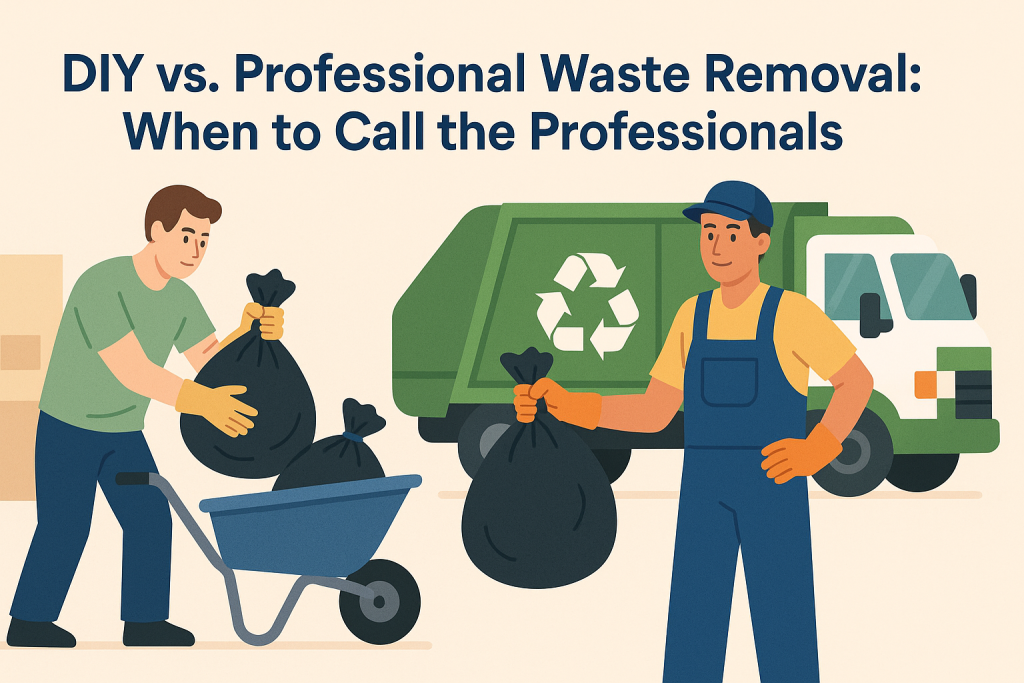 Waste removal is an inevitable part of life, whether you’re tackling a home renovation, clearing out your garage, or managing construction debris. In this article, we’ll break down the differences between DIY and professional waste removal. We’ll explore the pros and cons of each approach and help you determine the best course of action based on your specific needs.
Waste removal is an inevitable part of life, whether you’re tackling a home renovation, clearing out your garage, or managing construction debris. In this article, we’ll break down the differences between DIY and professional waste removal. We’ll explore the pros and cons of each approach and help you determine the best course of action based on your specific needs. What Is DIY Waste Removal?
DIY (Do-It-Yourself) waste removal means taking charge of collecting, transporting, and disposing of unwanted materials without the help of a waste removal service. This approach is common for tasks like decluttering your home, handling yard waste, or disposing of light construction materials after a small renovation.
Pros of DIY Waste Removal
- Cost-effective: You avoid service fees by doing the work yourself.
- Flexible: You can manage waste removal on your own schedule.
- Satisfying: Many people enjoy the hands-on approach and sense of accomplishment.
Cons of DIY Waste Removal
- Time-consuming: Sorting, loading, and multiple trips to disposal sites can take hours or days.
- Physically demanding: Lifting and hauling heavy or awkward items can lead to injury.
- Potentially risky: Mishandling hazardous materials or violating disposal regulations can result in fines or health hazards.
What Does Professional Waste Removal Involve?
Professional waste removal involves hiring a licensed company or service to handle the collection, transport, and disposal of unwanted materials. These services cater to a wide range of needs like small household pickups or full-scale commercial or construction site cleanouts.
Most companies offer:
- On-site pickup and loading
- Sorting and proper disposal of waste
- Recycling and donation of usable items
- Removal of hazardous or bulky waste
Pros of Professional Waste Removal
- Efficient and quick: Most professionals can remove large quantities of waste in a single visit.
- Safe and compliant: Trained crews handle hazardous or regulated materials safely and legally.
- Stress-free: You don’t need to worry about permits, transportation, or disposal logistics.
Cons of Professional Waste Removal
- Higher cost: Professional services charge based on volume, labor, or type of waste.
- Less flexibility: You may need to schedule in advance or wait for availability.
Key Factors to Consider When Choosing
Deciding between DIY and professional waste removal isn’t always black and white. Here are some important factors to help you make the right call:
Type and Volume of Waste
Small amounts of household junk or green waste are often manageable with a DIY approach. However, large volumes of heavy, bulky, or hazardous materials typically require professional handling.
Time and Effort Available
Do you have the time to sort, load, and transport everything yourself? If you’re on a tight schedule or can’t spare the energy, hiring professionals can save you significant stress and labor.
Health and Safety Risks
Some waste (like moldy materials, broken glass, or sharp metal), poses health and injury risks. If there’s any danger involved, it’s best to bring in trained specialists.
Legal and Environmental Regulations
Improper disposal can lead to legal issues and environmental harm. Professionals are familiar with local laws and disposal requirements, ensuring compliance and eco-friendly practices.
Budget Constraints
DIY is generally cheaper upfront, but consider hidden costs like fuel, equipment rental, and potential injuries. A professional service may be more cost-effective in complex or high-risk scenarios.
Case Studies / Scenarios
Here are a few real-world examples to help illustrate when DIY might suffice (and when professional help is the better option):
- DIY Scenario: You’ve cleaned out your garage and have a few boxes, some broken furniture, and garden clippings. You rent a trailer and make a single trip to the local recycling center. Simple, cheap, and manageable.
- Professional Scenario: You’re remodeling a kitchen and have cabinets, countertops, and drywall to dispose of. It’s too much for your car, and you’re unsure how to properly handle construction debris. A junk removal service arrives with the equipment and workforce needed to remove everything safely in one day.
- DIY Scenario: You’re doing a spring yard cleanup and need to get rid of leaves, branches, and a few old pots. With a few yard waste bags and a weekend of effort, you handle it yourself.
- Professional Scenario: A relative passes away, leaving behind a full home that needs to be cleared. Between the emotional stress and volume of items, a professional team is the smart, efficient choice.
Final Verdict: DIY or Pro?
Both DIY and professional waste removal have their place, and the best choice depends on your specific needs, limitations, and goals.
- Choose DIY when the job is small, manageable, and doesn’t involve hazardous materials. If you have the time, tools, and physical ability, it can be a satisfying and cost-effective option.
- Call the professionals when the waste is large-scale, heavy, dangerous, or time-sensitive. Their expertise ensures safety, legal compliance, and peace of mind.
Ultimately, the smartest approach is the one that saves you time, avoids unnecessary risks, and gets the job done efficiently.